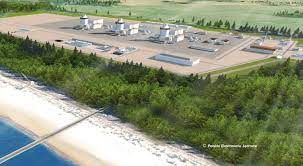
Westinghouse Electric Co., Bechtel, and state-owned Polish entity Polskie Elektrownie Jądrowe (PEJ) will work together to kick off design activity for Poland’s inaugural AP1000 nuclear power plant later this year and potentially ink a construction contract in 2025 to meet Poland’s goal to begin generating nuclear power in 2033.
The companies announced the timeline for the much-watched project on May 25, noting in a joint statement that “significant licensing and engineering work is already underway on the project.” The potential schedule is part of an agreement the three parties signed defining the principles of their cooperation in the design and construction of the nuclear power plant, which will be sited in Pomerania, northern Poland.
Westinghouse CEO Patrick Fragman suggested the timeline was realistic, given its partnership with Bechtel, an American engineering, construction, and project management giant, on other AP1000 projects. “The Westinghouse-Bechtel team is a proven one, as demonstrated by successfully powering up the first AP1000 reactor in the U.S. and nearing completion of the second, as well as four AP1000 units already in successful commercial operation globally,” he said. “We will use this experience to help Poland efficiently create a new, cleaner, more secure energy mix.”
A Solid New Step for Poland’s Nuclear Power Ambitions
Poland chose Westinghouse technology for its first large-scale nuclear plant in November 2022 amid a fierce international contest that included some of the world’s most prominent large nuclear plant vendors.
Poland has expressed an urgency to build new nuclear power to replace its coal plants, which it intends to phase out by 2040. In 2020, Poland produced 70% of its power from coal. As POWER has reported in detail, pivotal to Poland’s plans is the construction of about 6 GW to 9 GW of large-scale, pressurized water Gen III and III+ nuclear reactor designs, “zero-emission sources” that the government projects could “account for half of the installed capacity in 2040.” Meanwhile, the country’s February 2021 energy policy calls for its first nuclear power reactor to begin construction in 2026 and be completed by 2033.
So far, the country has unveiled the “SaHo” model, in which the state spearheads investment at the initial stage—taking over most of the high investment risk and high costs of capital at the investment stage—and then selling shares in the plant before grid connection to reduce its financial involvement in the long term. In July 2021, Poland established PEJ—an entity whose shares are currently 100% held by the state treasury—that it tasked with development of the investment process, site investigation, and obtaining permits and licenses for the country’s first nuclear power plant.
Shortly after the Polish government’s resolution selecting Westinghouse AP1000 technology for the Pomerania plant in November 2022, PEJ signed a cooperation agreement with Westinghouse in December 2022. In February, Westinghouse and PEJ concluded a contract for pre-design work. “Continuation of this cooperation between PEJ and the consortium of Westinghouse and Bechtel is the last of the steps before signing an Engineering Services Contract later this year,” PEJ said.
PEJ has said that it has favored a consortium model “from the beginning,” because it provides an opportunity to take advantage of the “unique competence and experience” Westinghouse and Bechtel gained during the construction of the two AP1000 reactors in the U.S. Bechtel notably joined the Vogtle expansion project in Georgia in 2017.
PEJ: Agreement Resulted From Intensive Negotiations
According to PEJ, the agreement signed with the American companies on Thursday resulted from “intensive negotiations that have been ongoing in recent months.” PEJ added that the agreement was necessary for future commercial contracts, including contracts for the design of the power plant.
The agreement also defines scope and responsibility. It specifies that Westinghouse and Bechtel will work together to design the nuclear facility, implement a work schedule, spearhead project control, and ensure project quality. Westinghouse will lead the design phase and Bechtel will lead the construction phase, PEJ said.
Poland’s government also lauded the formation of a formal consortium to build the plant. “The agreement signed today is the outcome of intense negotiations, but most of all, it is another milestone and strengthens the potential of the nuclear power plant project,” said Anna Moskwa, Minister of Climate and Environment.
“Today, we are even closer to the construction of a nuclear power plant in 2026 and generation of nuclear power in 2033. It will allow us to achieve the goal of having 25% share of nuclear energy in our energy mix in 2040. We are excited to work with partners who are open to local content – Polish economy, Polish enterprises, Polish services, and Polish human resources. We are getting ready for this challenge,” she added.